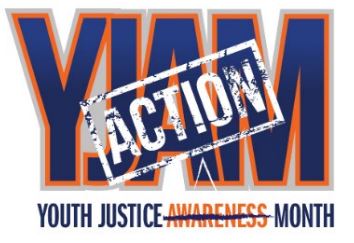Reclaiming Futures is proud to support Youth Justice Awareness Month. As such, we asked Mr. Brian Evans, the State’s Campaign Director at Campaign for Youth Justice to tell us about its history and purpose. Mr. Evans told us:
Youth Justice Awareness Month (YJAM) started back in 2008, when Tracy McClard, a mother from Missouri who lost her son to suicide in an adult jail, organized a 5K race in October to raise awareness about the harmful practice of treating children as adults in the criminal justice system. Each October since then, YJAM has seen more activities and more events highlighting what is wrong with trying kids as adults. Film screenings, panel discussion, art exhibitions, and more ambitious endeavors like Tracy’s bike ride across the state of Missouri last year, have all drawn attention to and helped build a growing consensus that we need to reform the way we approach youth justice.
As President Obama said this year in his second annual proclamation of Youth Justice Awareness Month: “When we invest in our children and redirect young people who have made misguided decisions, we can reduce our over-reliance on the juvenile and criminal justice systems and build stronger pathways to opportunity.”
Since the first YJAM in 2008, we have seen increased awareness lead to concrete action. Over the past decade around 30 states have passed legislation keeping young people out of the adult criminal justice system. So this year, we YJAM is being re-branded as Youth Justice Action Month. More and more it has become apparent that we know what the problems are. Now, it is time for advocates, legislators, and governments to take action
 Juvenile Justice Reform
Juvenile Justice Reform
- A Look Inside Juvenile Justice Reforms (FremontTribune.com)
Report from Nebraska Gov. Dave Heineman: "A few weeks ago, I signed into law one of the most important bills of the 2013 legislative session -- Legislative Bill 561 which is aimed at improving the juvenile justice system in our state. It shifts the supervision of all juvenile offenders in the community to the state’s probation system which reduces reliance on detention and focuses on rehabilitation for youth while keeping families involved."
- When Is a Juvenile No Longer a Juvenile? (BostonMagazine.com)
When it comes to incarceration, Massachusetts has recognized 17 as the age of adulthood since 1846. Of course, anyone who has a 17-year-old might question that assumption, as have citizens in 38 states across the U.S. Even some states we think of as far more conservative than Massachusetts—Arizona, Alabama, and Mississippi, for example—send lawbreakers younger than 18 to juvenile instead of adult court.
- Program Might Reduce Minorities in Juvenile Detention (Valparaiso Community News)
The city of Valpairiso, Indiana's Advisory Human Relations Council is exploring how to help reduce racial bias within the juvenile justice system. Tony McDonald, a Porter County juvenile probation officer and coordinator of the Juvenile Detention Alternatives Initiative, spoke to City Council members at their regular monthly meeting Tuesday at City Hall.
- Why Maine is a Leader in Juvenile Justice (BDN Maine)
The criminal justice system is often thought of as existing on a pendulum. Opinions about how the system should operate swing from one end of the spectrum to the other over time. In its early history, rehabilitation ruled the day in corrections. The prison was initially called a “penitentiary,” representing the idea that offenders would give penance, pray and leave a changed person. However, the pendulum swung the other way in the 1970s, when public sentiment moved toward the idea that offenders cannot be rehabilitated and punitive measures are best for society.


 Juvenile Justice Reform
Juvenile Justice Reform